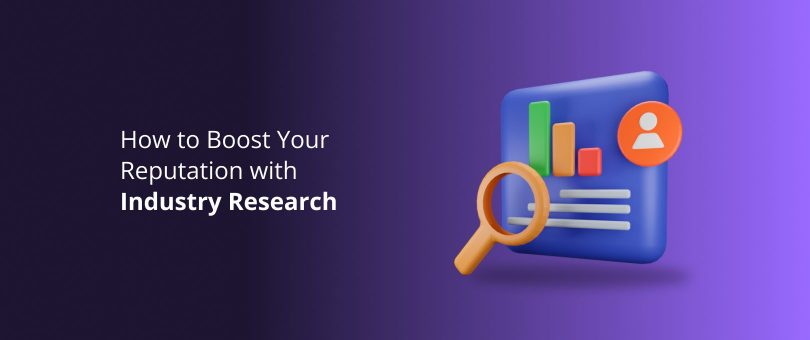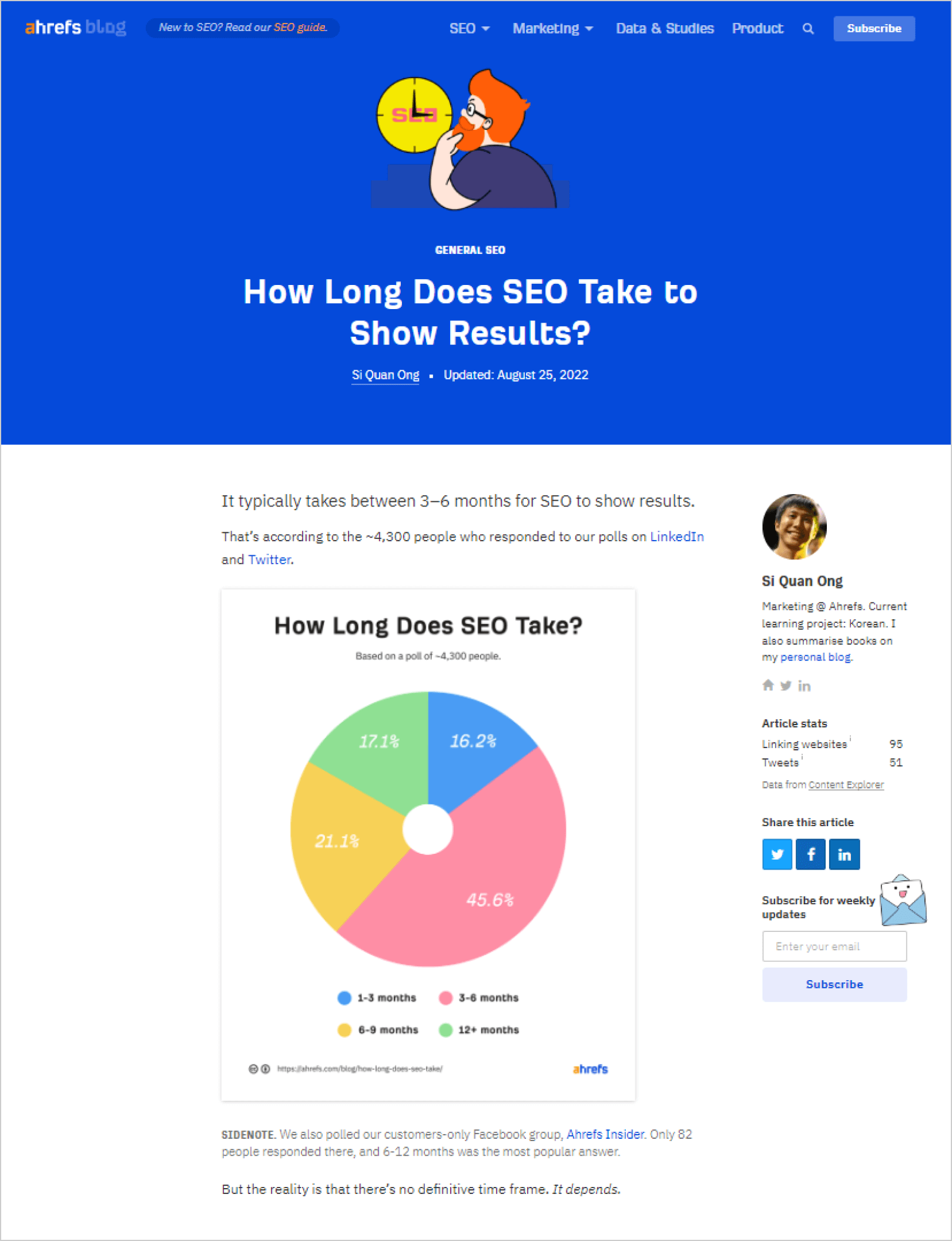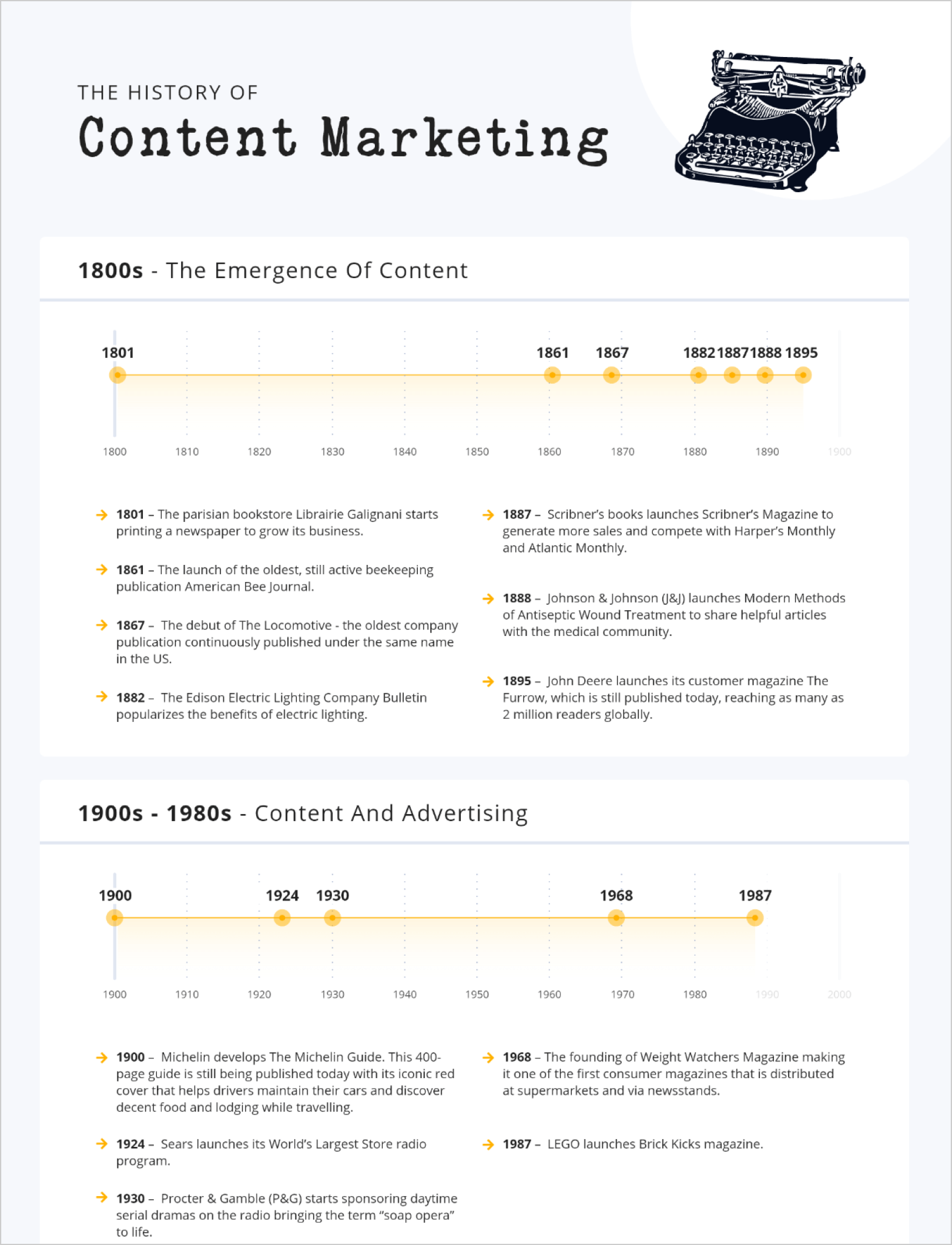For brands, reputation is everything. A great way to boost your reputation and authority, and consolidate your image as an expert is to conduct and publish industry research.
Even if you provide the best product or service in the industry, if you have a questionable reputation, customers may avoid you in favor of the competition.
And a positive reputation leads to brand recognition, trust, and loyalty.
However, in today’s competitive marketplace, building a good name for your brand and standing out can be challenging.
Industry research is the type of thought-leadership content that may not only help you establish your name as an industry leader, but earn the respect of both customers and counterparts.
In this article, we’ll talk about the benefits of industry research for your reputation, and highlight three different ways to implement it.
Read on and take notes!
What Is Industry Research?

Industry research is a type of study that collects and analyzes data regarding a specific industry. Depending on the goals of the research, it can focus only on facts and statistics, or it can also provide analysis and insights based on the data.
Furthermore, again, depending on the goals, it can focus on one pertinent topic or explore different aspects of the industry.
The research can take advantage of various research disciplines and methodologies, including, but not limited to:
- Surveys
- Focus groups
- Interviews
- Covert and overt observation
- Cross-disciplinary analysis
- Historical data analytics
- Predictive analytics
- Product and services comparisons
- Market share analysis
In addition, to increase the value of the research and provide more meaningful insights, the study can include data from multiple sources:
- Corporate data
- Public archives
- Government data
- Marketing data
- Financial reports
- Market research
- Consumer behavior analysis
The industry research reports can be distributed to interested parties, and published on the provider’s digital channels, in specialized industry print, and in digital journals.
Furthermore, they can be offered as free or paid content, and/or used as lead magnets in the company’s lead generation strategy.
How Industry Research Benefits Your Reputation
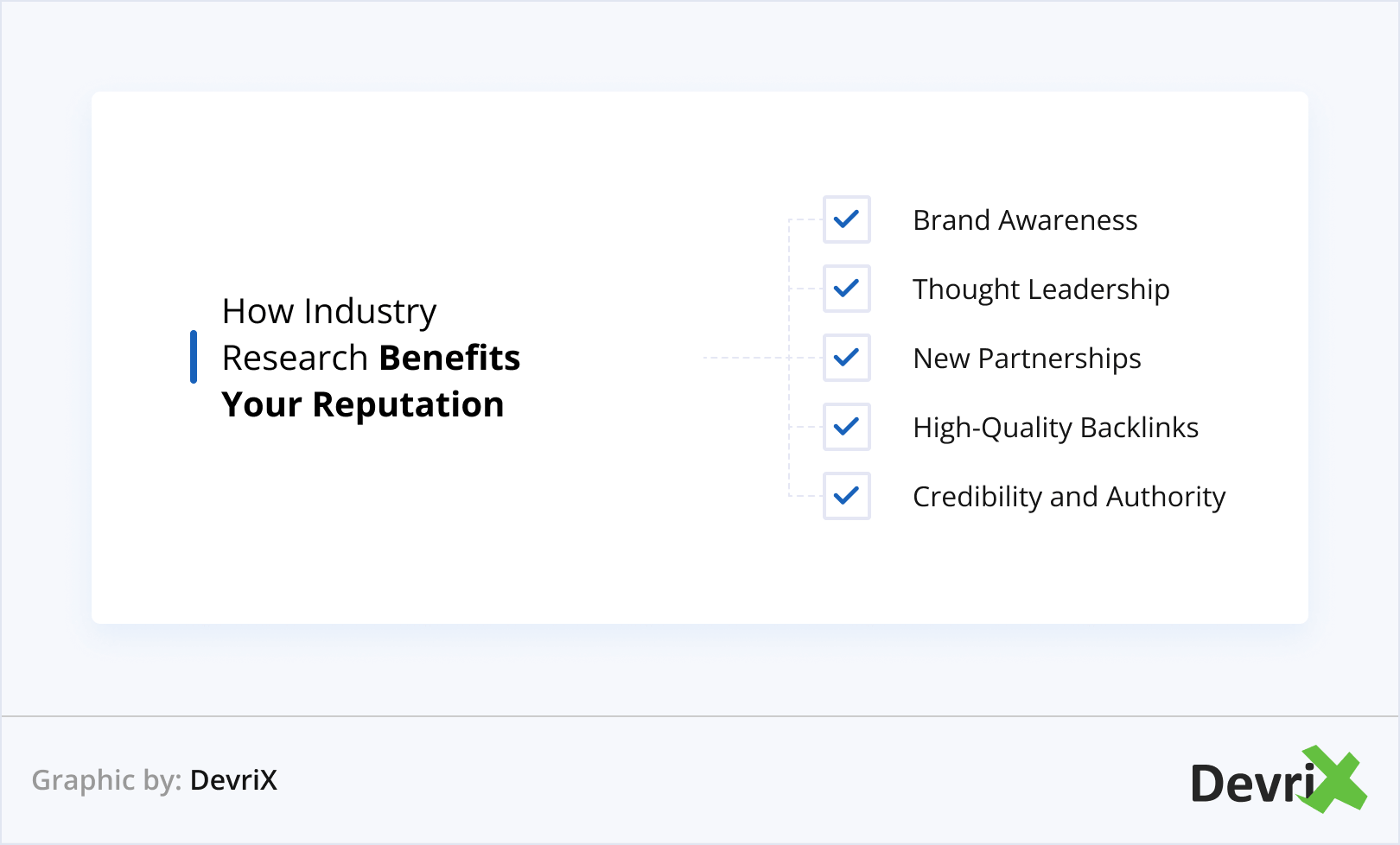
The most notable advantage of industry research is that it shows you as an expert.
However, there are other benefits, including, but not limited to:
Brand Awareness
When you publish interesting and relevant information, people in the industry are more likely to learn your name and remember it.
This can create a buzz around your brand and lead to more mentions, social media activity, and word-of-mouth. As a result, both your awareness and recognition may benefit, because, simply put, people will learn your name.
And if they’ve already heard about you, they are more likely to associate your brand with authority, competence, and professionalism.
All this buzz can also positively affect your SEO and SERP branding because search engines are quick to catch on to trending topics and prioritize them in search results.
You may also boost your chances of ranking well with Google products, such as Discover, News, and Top Stories.
Also, Google has a mobile feature that suggests trending searches before users start typing.
Thought Leadership

The results from your research can deliver valuable insights about your industry and help you establish yourself as a thought leader.
You can use them to create different types of content and provide analysis, raise questions, and dive deeper into the meanings behind the statistics and raw information.
These pieces can be published across your communication channels, and leveraged to start discussions on relevant industry topics that your peers care about.
Furthermore, even if you only provide facts and statistics without additional analysis, you can still be a thought leader. That’s because the highlights you deliver can inspire others to create interesting content themselves, look further into the facts you’ve discovered, and share their own points of view.
All in all, thought leadership is not only about groundbreaking ideas and controversial topics. Sometimes just making people think about a topic or question is enough.
New Partnerships
Boosting your brand awareness and building a reputation as a thought leader can pave the way to new partnerships.
This includes not only client acquisition but new connections with other companies in your industry as well. Also, it can inspire comarketing campaigns in collaboration with viable businesses and/or brands from other fields.
That’s because once the word is out that you are a competent expert, and have in-depth knowledge of the industry, people will pay more and more attention to your brand. As a result, if you are consistent and keep up the good work, your reputation will keep growing.
Furthermore, more often than not, when conducting industry research, companies partner up with data management professionals that can provide the tools and know-how to help them process the information.
These types of connections can also provide ideas on how to further utilize your data, improve your decision-making process, and grow your business.
High-Quality Backlinks
Industry research is as valuable to its target audience as it is to its provider.
As mentioned, other businesses can base whole pieces of content on your research, quote it to fact-check their statements and boost the credibility of their content, or simply mention it as an interesting statistic.
However, the thing is, that for these types of statements to seem more credible, it’s a good rule of thumb to link back to the original source. Otherwise, the reader has no way of knowing whether or not the information is real or just a made-up fact.
For you, as the publisher, this means obtaining multiple high-quality backlinks from industry-relevant websites.
And these are the best types of backlinks because they can really boost your authority and skyrocket your ranking.

As everyone in SEO knows, high-quality backlinks are one of the most important ranking factors.
In other words, by publishing industry research, you are likely to enjoy a traffic boost, as well as an improved SERP presence and SEO branding.
Credibility and Authority
When others in the industry talk about you with respect and your name is associated with high-quality industry insights and statistics, this can boost your overall credibility and authority.
Clients are likely to trust you more when you are a known expert and may choose your brand over competitors because you have a reputation as someone who knows what they are doing.
This type of social and industry proof can benefit your Google EAT immensely. It provides search engine algorithms with the reassurance they need in order to know that your content is reliable, and show it more often in relevant searches.
At the same time, the more you appear on the first page of search results, the more users will click on your links, because, to customers, first-page results seem more credible and legitimate.
And the more people who click on your links, the more often Google will show your pages in the SERPs because you have high engagement.
It’s a virtuous cycle in which you are the winner.
How to Conduct Industry Research?
While industry research may sound like an intimidating and complicated process, in fact, it doesn’t have to be.
Sometimes, all you need to do is ask the right people the right questions, make the results public, and share your thoughts on them.
For example, if you have a large following on Linkedin, you can start a poll on an industry hot topic, and write an article (or create a podcast or video) with your take on what the results mean. Just like Ahrefs did:
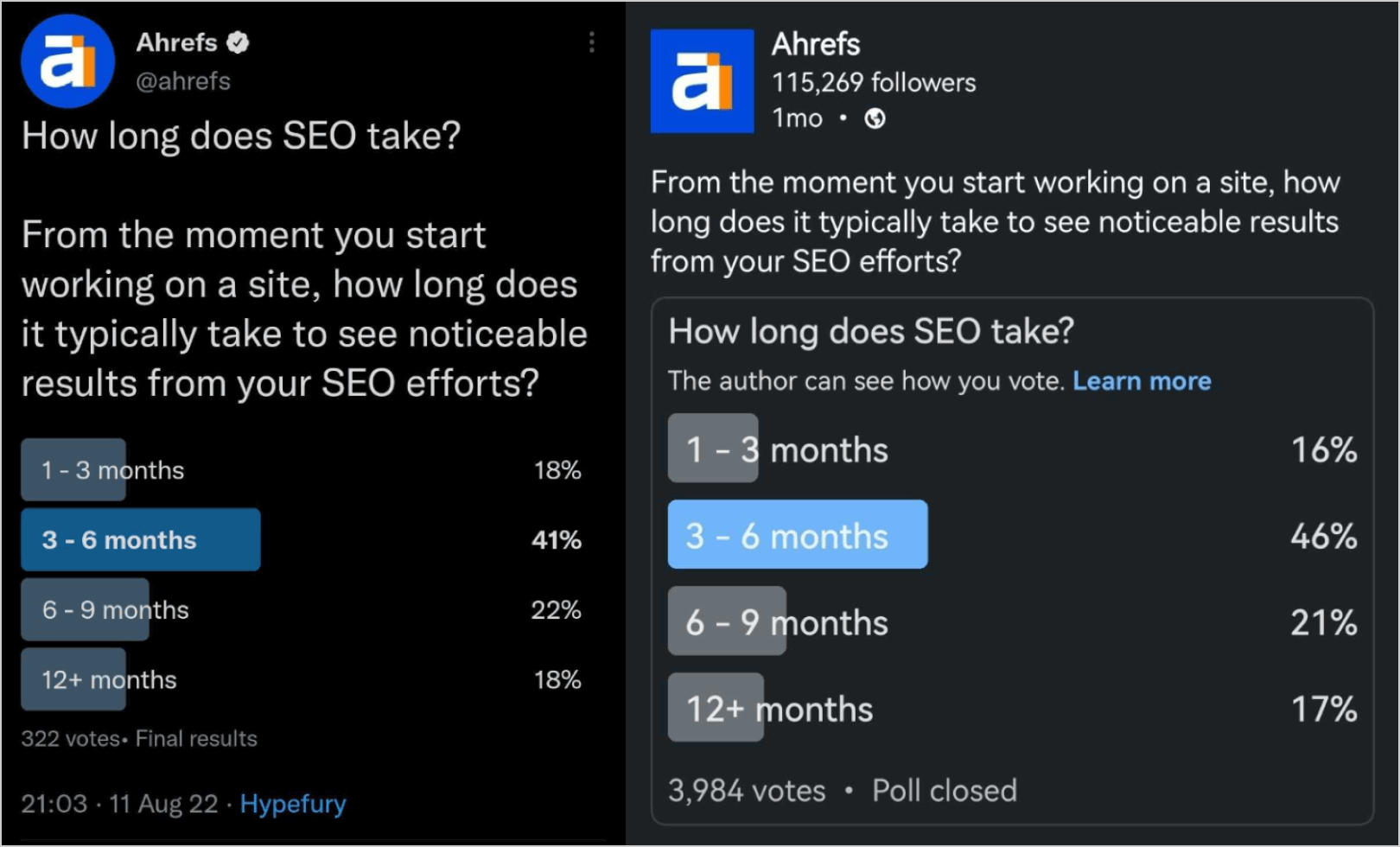
However, there are other ways to conduct industry research:
1. Distribute Surveys
As you can see from the example above, surveys are one of the easiest and most accessible ways to obtain industry insights.
The questions that you ask depend on the specifics of your industry. However, there are, generally, three ways to approach this type of industry research. You can – focus on the clients, talk to other businesses, and/or compare the two.
- Focus on what clients want. You can ask customers about their needs and preferences; what they look for in a product; how they choose a business; what matters to them when it comes to customer service; what issues they see in the products and services available; gauge demand; and anything else that may be relevant to your industry.
Not every business has the resources to conduct such research. So, your reports can help companies better understand the market, i.e their existing and potential customers.
- Focus on what companies do. You can reach out to others in the industry to ask how they allocate their budget and resources; what challenges they face; their growth rate; what changes they intend to make in the relevant fields; how pertinent economical changes affect their business; how the latest consumer trends affected their business; new technology adoption; digital transformation; etc.
By analyzing these types of information, your industry report can provide benchmarks. In addition, it can forecast trends, view common issues and solutions, and have a take on other relevant insights.
These may allow companies in the industry to understand where they stand against the competition. As a result, they can see if they are up to par, and optimize their strategies.
- Comparison between the two. If you want to go the extra mile, you can analyze what customers say they want and need. Then, compare it with what a business thinks their customers want and need.
This approach is probably the most interesting. At the same time, it’s the most difficult one. After all, it involves double the resources, as well as cross-analysis, which can be challenging.
However, these types of insights can draw the most attention from both within and outside of your industry. Therefore, they show the gap between supply and demand.
2. Analyze Existing Third-Party Data
A different approach to industry research is to compile and analyze existing data from existing sources. This can be public and government information, historical data, news, and all types of PESTEL analysis.
You can analyze this data to identify patterns and trends, draw conclusions, and pull insights.
The fact that the information may not be entirely new will not diminish the value of your research. The insights you provide will still be relevant.
In addition, you can cross-reference the results with your own data, and provide additional value.
For example, you can build a report showing the history and development of your industry (or an element from it). In it, you can highlight its evolution, its innovation, how technology affected it, and so on.
Or you can pull insights from historical information and perform your own study or current and predictive data, cross-reference them, and analyze the results.
3. Use the Data You Have
Depending on the type of industry and business, you probably have your own corporate data. This can be information from your financial, R&D, marketing, production, or any other department.
It’s the type of data that shows how KPIs fluctuate over time based on changes in the market and in your organization. In addition, it illustrates how your customers react to marketplace factors such as seasonal changes, and so forth.
Any data you use in your own decision-making process can be analyzed and cross-referenced against outside factors to identify patterns, trends, and other interesting findings.
Similar to content marketing, showing your expertise and knowledge for free doesn’t rob you of revenue. In fact, it can attract even more revenue. After all, it shows that you are not only an expert but a thought leader. Also, you demonstrate you understand your industry well enough to help it grow and develop.
Bottom Line
Industry research can be a powerful tool in boosting your reputation and standing out as an expert in your field.
This type of authority can attract new customers and help you build valuable partnerships with other companies.
Furthermore, it can be leveraged to expand your digital presence. This way you can take over SERP real estate, and create a strong SEO brand.
